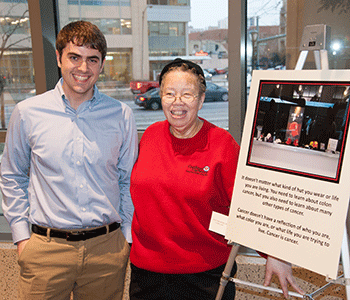Saving Ronald Rancher’s life started with a little encouragement and a trip to the doctor.
That was three years ago, when a friend suggested he undergo routine screening for prostate cancer. The exam detected the disease, which was treatable, and today the 60-year-old is cancer free.
“If it hadn’t been for her, I wouldn’t have known I had cancer,” Rancher said about his friend.
But she wasn’t done yet. Knowing Rancher also hadn’t been screened for colon cancer, she encouraged him to get a colonoscopy. Fortunately, that test turned out negative.
As a sign of gratitude, Rancher honored his friend in a photo, part of a Feb. 28 exhibition hosted by Siteman Cancer Center’s Program for the Elimination of Cancer Disparities. His image bears her name, Monica — a simple yet meaningful tribute for her life-saving suggestions.
“She convinced me to go, and she kept taking me to the doctor,” he said.
The photograph was one of 16 on display at the Center for Advanced Medicine, all taken by participants of the Photovoice project. Equipped with Kodak point-and-shoot cameras, they documented people, places and things that make up their daily lives – but also represent a reminder of the need for colon cancer screenings. Subjects chosen for their symbolism included a gym, a sculpture of hands positioned in prayer, even an abandoned plant in need of nurturing.

Participant Vivian Elgin photographed a display of hats and caps. The variety of styles symbolizes different types of people, she said, but the common function of the hats reminds us of our similarities.
“Cancer affects everyone,” said Elgin, 69.
Supported by the National Institutes of Health, the project is meant to serve as a conversation starter for friends, relatives, co-workers and others about the importance of cancer screening.
The American Cancer Society recommends that men and women undergo a colonoscopy every 10 years, beginning at age 50. Less invasive tests also are available that, while less effective, still reduce the risk of colorectal cancer death. People at higher risk of developing colorectal cancer, including those with a family history of the disease, should talk with their doctors about earlier, more frequent screenings.
“This isn’t something people typically talk about,” said Aimee James, PhD, a Washington University assistant professor of surgery who oversaw the project with Jean Hunleth, PhD, a postdoctoral research associate at the School of Medicine. “We were happy with how people used the cameras, the photos and the stories to interact.”
Three groups met over a few months at the Center for Advanced Medicine, pondering how their images, and the act of taking them, might encourage others to schedule a screening.
Rancher is living proof of the value of regular checkups and of the caring push a friend sometimes needs to give. He shares his story to motivate others.
“I tell them they need to get their colonoscopy, to go get checked out,” Rancher said. “There are a lot of people out there who don’t know they have cancer.”
To see the photos that were showcased during the event, follow this link.